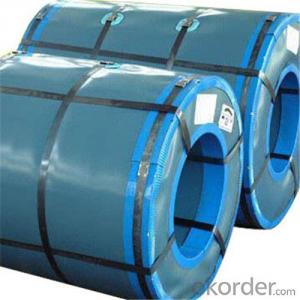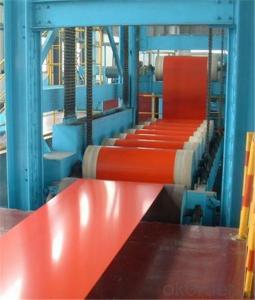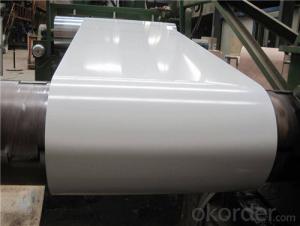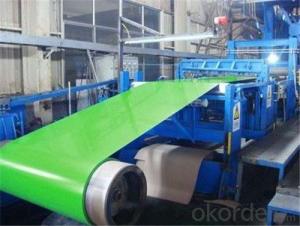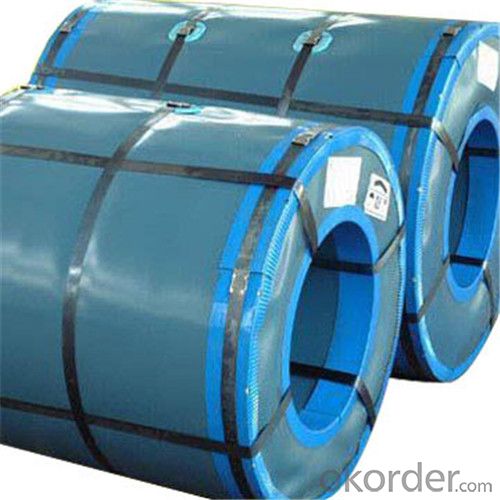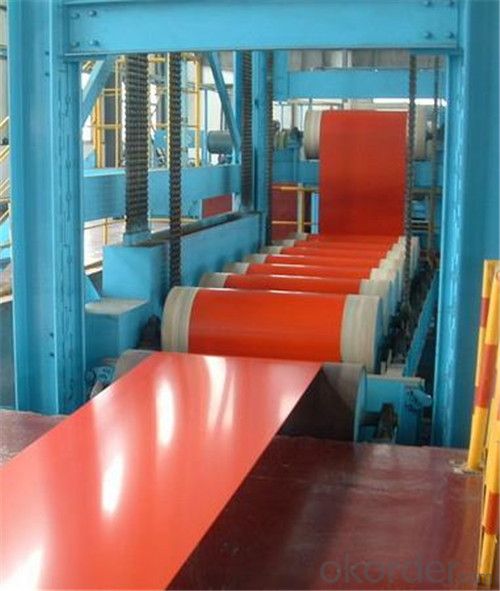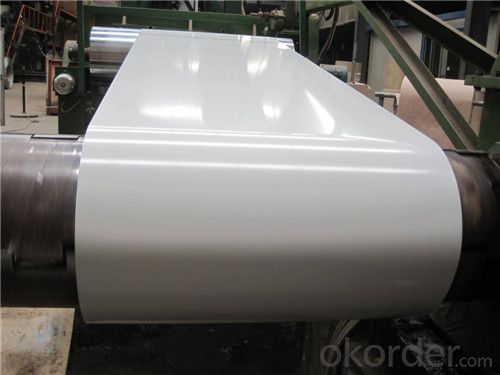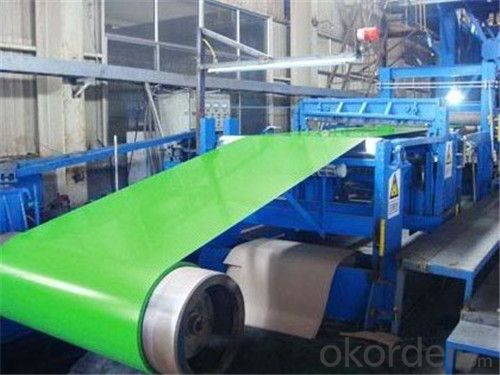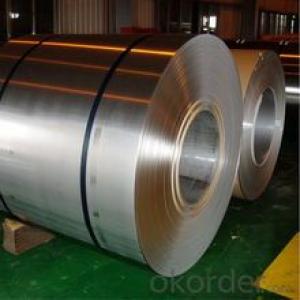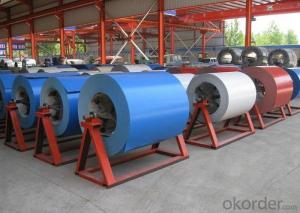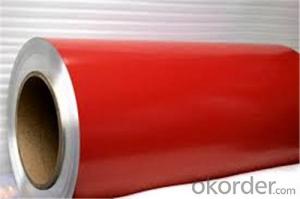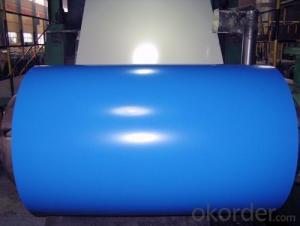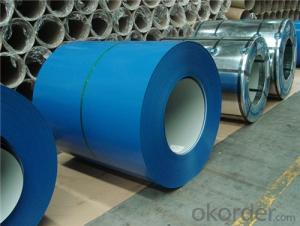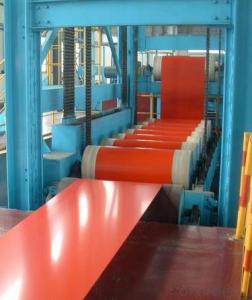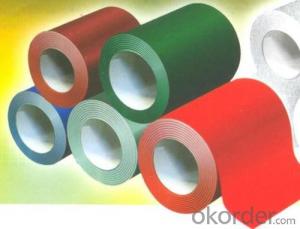Prepainted Rolled Steel Coil for Construction roofing Constrution
- Loading Port:
- Shanghai
- Payment Terms:
- TT OR LC
- Min Order Qty:
- 50 m.t.
- Supply Capability:
- 30000 m.t./month
OKorder Service Pledge
OKorder Financial Service
You Might Also Like
Structure of Prepainted Rolled steel Coil for Construction Roofing
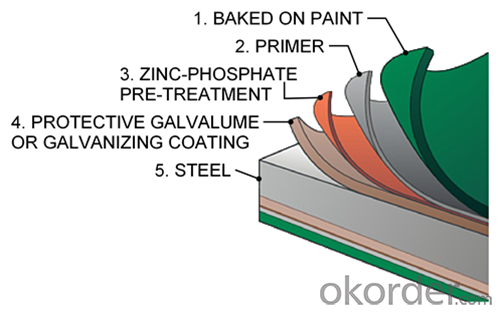
Description of Prepainted Rolled steel Coil for Construction Roofing
Prepainted Rolled steel Coil is a kind of coated steel coil/sheet. With the cold rolled steel of different strength and thickness as substrate, it is produced through applying Al-Zn coat on both faces by hot dip process. In its coating, Al accounts for about 55%, Si 1.6%, while the remaining is Zn. Aluminum zinc coils enjoys both the physical protective feature and durability of Al and the electrochemical protective property of Zn. And its surface has bright silver color and regular embossed-like figure, which are highly decorative.
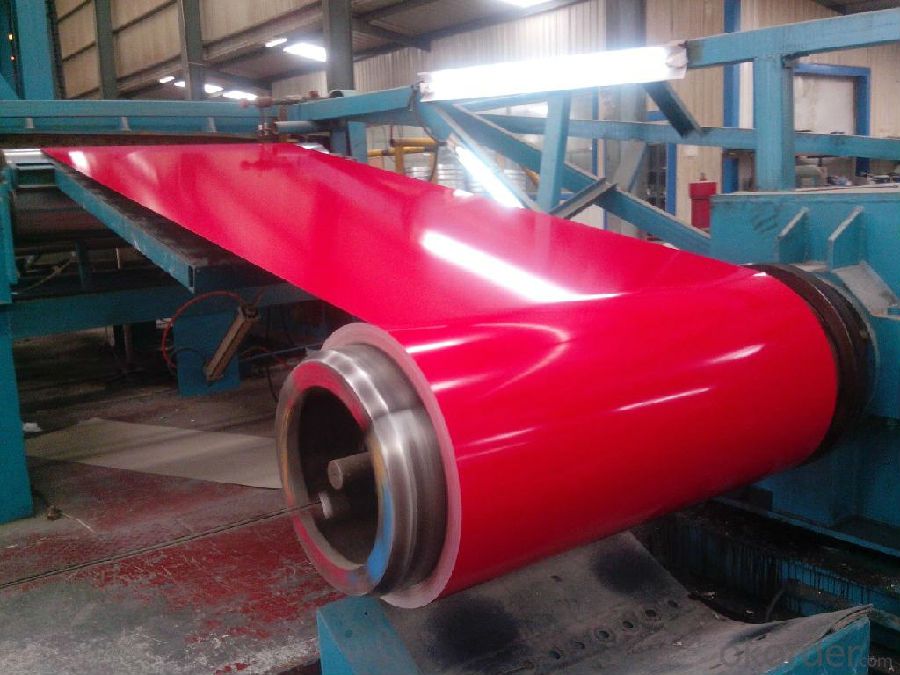
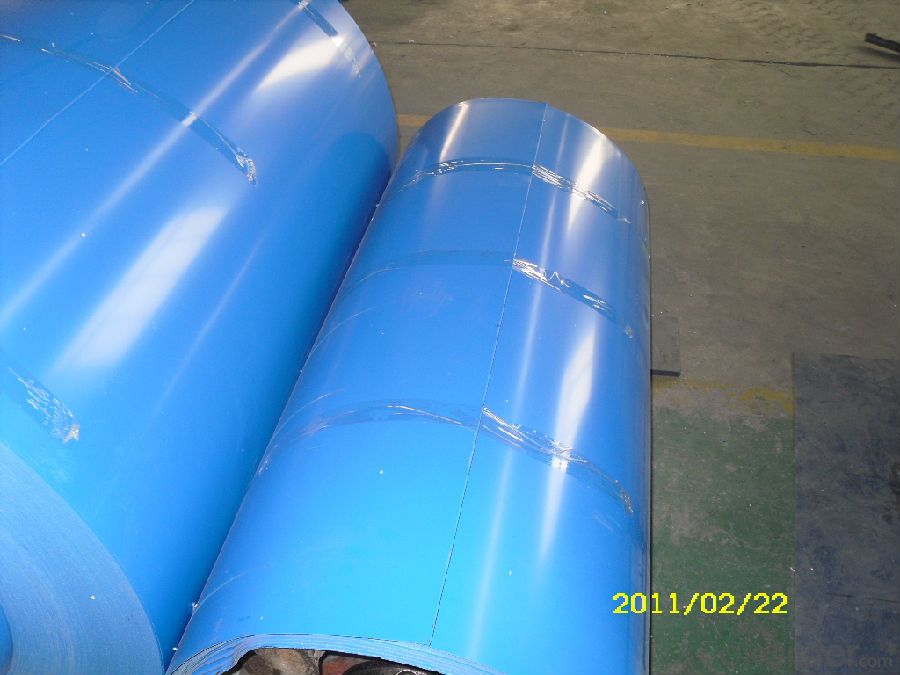
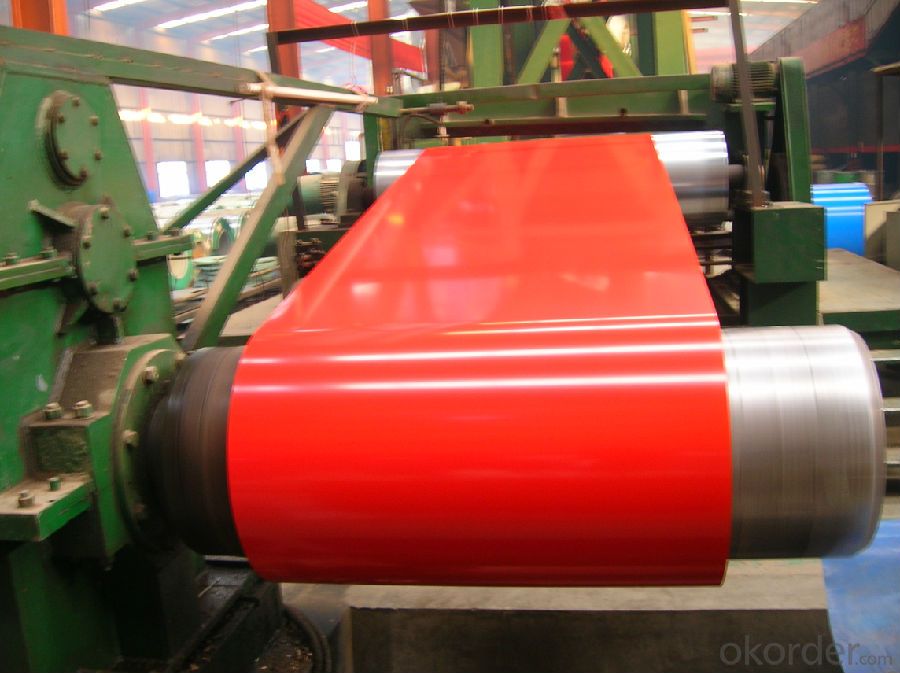
Main Feature of Prepainted Rolled steel Coil for Construction Roofing
1.Corrosion resistance: It mainly depends on the aluminum protection. When the zinc being worn, the aluminum will form a dense layer of aluminum oxide, resist corrosion material to prevent further corrosion inside.
2. Heat resistance: Aluminum zinc alloy steel sheet has excellent heat resistance, can withstand high temperatures over 300 centigrade, and is similar with aluminized steel high temperature oxidation resistance. It often used in chimney pipes, ovens, fluorescent lighting device and the device cover.
3. Heat reflective: Galvanized steel plate heat-reflective high rate is twice as galvanized steel, often used to make insulation materials.
4. Economy: Because density of 55% AL-Zn is smaller than the density of Zn, so in the same weight and thickness of Galvanized zinc layer, aluminum-zinc steel plate is larger area more than 3% of galvanized steel sheet.
Applications of Prepainted Rolled steel Coil for Construction Roofing
1. Construction and building: roofing; ventilating duct; handrail; partition panel;etc.
2. Electric appliance: refrigerator; washing machine; refrigerator; DVD;etc.
3.Transportation: oil tank; road sign; etc.
4.Agriculture:barn; etc.
5.Others:vending machine; game machine; etc.
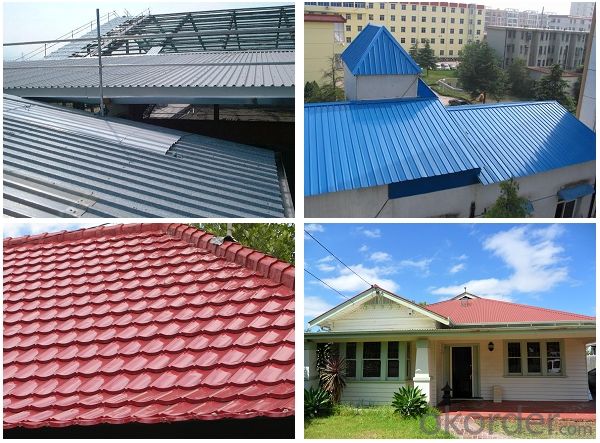
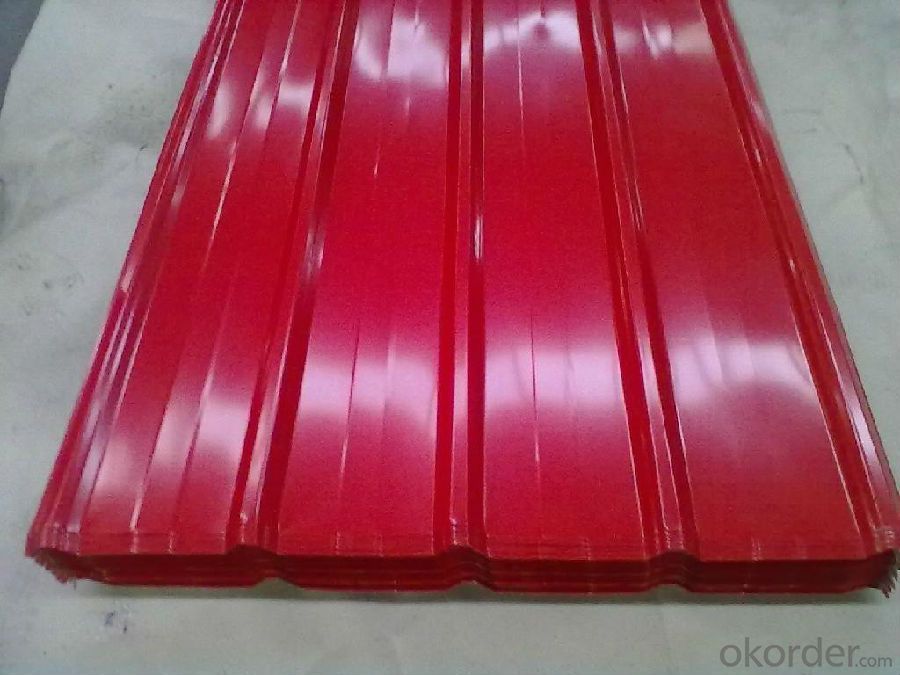
Specifications of Rolled steel Coil for Construction Roofing
Product | Prepainted Rolled steel Coil for Construction Roofing |
Material Grade | SGCC / SGCH / DX51D+AZ, etc |
Thickness | 0.2-3.0mm |
Width | 600-1500mm |
Tolerance | Thickness: +/-0.02mm , Width:+/-2mm |
Zinc-coating | AZ40-150g/m2 |
Technique | Raw material: Hot rolled steel coil --> Cold rolled_>hot dipped galvalume |
Surface | Dried, Chromated, Unoiled |
Spangle | Regular spangle , small spangle, zero spangle |
ID | 508MM |
Coil weight | 10MT max |
Export package | Cardboard inner sleeves, Waterproof paper, galvanized steel covered and steel strip packed |
FAQ of Prepainted Rolled steel Coil for Construction Roofing
We have organized several common questions for our clients,may help you sincerely:
1. What is the minimum order quantity ?
Our MOQ is 50mt for each size. And we will consider to give more discount if you make big order like 1000 tons and more. Further more, the more appropriate payment term your offer the better price we can provide.
2. How long can we receive the product after purchase?
Usually within thirty working days after receiving buyer’s advance payment or LC. We will arrange the factory manufacturing as soon as possible. The cargo readiness usually takes 15-25 days, but the shipment will depend on the vessel situation.
3. How to guarantee the quality of the products?
We have established the international advanced quality management system,every link from raw material to final product we have strict quality test;We resolutely put an end to unqualified products flowing into the market. At the same time, we will provide necessary follow-up service assurance.
- Q: Nickel is ferro magnetic in nature. But when it is added with stainless steel, it makes stainless steel non-magnetic. What is the structural changes happened with the presence of nickel?
- All stainless steel is non magnetic.
- Q: What are the different types of steel coil coatings?
- There are several different types of steel coil coatings that are used for various purposes. Some of the most common types include: 1. Galvanized Coating: This is a zinc-based coating that provides excellent corrosion resistance to steel coils. It is often used in outdoor applications where the coils are exposed to harsh weather conditions. 2. Galvannealed Coating: Similar to galvanized coating, galvannealed coating also contains zinc, but it is heat-treated to form an alloy with the steel surface. This type of coating provides better paint adhesion and is often used in applications where the coated coils will be painted or further processed. 3. Pre-painted Coating: As the name suggests, pre-painted coatings are applied to steel coils before they are delivered to customers. These coatings can be made of various materials, including polyester, polyurethane, epoxy, or fluoropolymer. Pre-painted coils are commonly used in construction, automotive, and appliance industries. 4. Electro-galvanized Coating: This coating is applied to steel coils through an electroplating process, where a thin layer of zinc is deposited on the surface of the steel. Electro-galvanized coatings provide good corrosion resistance and are often used in indoor applications or where a thinner coating is desired. 5. Aluminized Coating: Aluminized coatings are made by applying a thin layer of aluminum to the surface of steel coils. This type of coating provides excellent heat resistance and is commonly used in exhaust systems, ovens, and other high-temperature applications. 6. Organic Coatings: Organic coatings are typically applied to steel coils to provide additional protection against corrosion and improve aesthetics. These coatings can be in the form of paints, lacquers, or powder coatings, and they can be customized to meet specific requirements in terms of color, gloss, and durability. Overall, the choice of steel coil coating depends on the specific application, environmental conditions, desired aesthetics, and performance requirements.
- Q: I'm looking for a steel plate for an design project that requires neodymium magnets to be stuck on them. I am trying to figure out what kind of steel plate would have hold the magnets up the best.
- the more the iron the more ferrous it is which means magnets stick better the best would be using iron alloy (mainly iron) but you could also use really any type of steel (almost all alloys contain iron)
- Q: If rail ties were melted, would they be like any other type of steel?
- As so much about the railroad is variable, so is the steel used for the rail. For one thing, all rail is not the same size. It is classified by weight per yard. For example, most tangent (straight) track is 139 lbs rail, meaning three feet of it weighs this much. Secondary track, such as found on branch lines and in yards or used on sidings is not as heavy. Track used in curvature may be the same weight, but not always. The reason is there is much more stress imparted to the roadbed in curvature. Most steel on main tracks has a higher carbon content, but there is a point of diminishing returns, as this rail is more brittle as a result. Good luck trying to melt it. In the field, this rail is cut by a saw with diamond studded circular blades. The reason why is it takes a lot more time to try to cut it with an acetylene torch. In the US, certain areas, such as on some bridges, the cross-ties (sleepers) are indeed made of steel, in addition to concrete and wood. The potential for fire is too great for wood in these instances. In addition, if even a single wheel derails, concrete ties tend to explode when stressed this way. All of which makes steel cross-ties worth the extra cost.
- Q: What are the different methods of painting steel coils?
- There are several different methods of painting steel coils, each with its own advantages and applications. 1. Coil coating: This is a continuous and automated process where a coil of steel is unwound, cleaned, pretreated, primed, painted, and cured before being rewound. Coil coating offers excellent control over the paint application and ensures a consistent finish. It is commonly used for high-volume production of steel coils, such as in the automotive and construction industries. 2. Spray painting: This method involves manually or mechanically spraying paint onto the steel coils. It is a versatile and flexible method that allows for customization and precise control over the paint application. Spray painting can be done in various ways, such as airless spraying or electrostatic spraying, depending on the desired finish and the specific requirements of the project. 3. Dip coating: Also known as immersion coating, this method involves immersing the steel coils into a tank of paint. The coils are carefully lowered into the paint, ensuring that all surfaces are fully coated. Dip coating is often used for large or bulky steel coils that cannot be easily spray painted. It provides excellent coverage and can be suitable for certain applications, such as in the electrical or appliance industry. 4. Powder coating: This method involves applying a dry powder paint to the steel coils using an electrostatic process. The charged powder particles adhere to the grounded coils, creating a durable and even coating. Powder coating offers excellent resistance to impact, chemicals, and UV rays. It is commonly used in applications where a high-quality and long-lasting finish is required, such as in the aerospace or outdoor equipment industry. 5. Roll coating: This method involves passing the steel coils through a series of rollers that are partially submerged in paint. As the coils go through the rollers, the paint is transferred onto their surface. Roll coating is often used for thin or delicate steel coils, as it provides a gentle and uniform paint application. It is commonly used in the appliance or electronics industry. Each method has its own advantages and is chosen based on factors such as the desired finish, production volume, cost, and specific requirements of the project. Ultimately, the choice of painting method depends on finding the most suitable balance between quality, efficiency, and cost-effectiveness.
- Q: How are steel coils processed for edge trimming or conditioning?
- Steel coils are processed for edge trimming or conditioning through a series of steps. First, the steel coils are unwound and fed into a machine that trims the edges to remove any irregularities or imperfections. This process helps ensure that the edges of the steel coils are straight and smooth. After edge trimming, the coils may undergo further conditioning processes such as leveling, slitting, or recoiling, depending on the specific requirements of the end product. These processes help to refine the steel coils and prepare them for various applications in industries such as automotive, construction, or manufacturing.
- Q: What are the different methods of protecting steel coils from corrosion?
- Some common methods of protecting steel coils from corrosion include applying a protective coating or paint, using corrosion inhibitors, implementing cathodic protection systems, and storing the coils in a controlled environment with low humidity and proper ventilation.
- Q: How are steel coils used in the manufacturing of automotive accessories?
- Steel coils are commonly used in the manufacturing of automotive accessories due to their strength, durability, and versatility. These coils serve as the primary raw material for various components and parts used in the automotive industry. One of the most common uses of steel coils in automotive accessory manufacturing is for the production of body panels and frames. These coils are formed and shaped into the desired size and design, and then undergo various processes such as cutting, stamping, and welding to create the body panels and frames of vehicles. The high strength of steel coils ensures that the body panels and frames are sturdy enough to withstand the rigors of daily use and provide the necessary structural integrity to the vehicle. Additionally, steel coils are also used in the production of automotive suspension systems. Coil springs, which are integral components of the suspension system, are typically made from steel coils due to their ability to absorb and distribute the weight and impact of the vehicle. These coil springs contribute to a smooth and comfortable ride by providing the necessary support and shock absorption. Furthermore, steel coils are used in the manufacturing of automotive accessories such as exhaust systems, brackets, and brackets for various components. The coils are formed and shaped into the required design and then undergo processes like cutting, bending, and welding to create these accessories. The strength and durability of steel make these accessories capable of withstanding high temperatures, vibrations, and other harsh operating conditions. In summary, steel coils play a crucial role in the manufacturing of automotive accessories by providing the necessary strength, durability, and versatility required for various components and parts. From body panels to suspension systems and accessories, steel coils contribute to the overall quality, performance, and safety of automotive accessories.
- Q: How is steel different than iron?How many different kinds of steel are there?What type is the strongest?Which type is the weakest?
- steel has carbon in it instead of just iron there are hundreds if not thousands of different kinds of steel for different applications strength depends on the definition. some have stronger tensile (pull) strength than others.
- Q: I like non-stick cookware but it dont hold up no matter how much money you spend. What isthe best kind? Is there something better then stainless steel or iron skillet? I do not care if I have to use extra elbow grease to clean a pan.
- Some utensils are both cookware and bakeware. The choice of material for cookware and bakeware items has a significant effect on the item's performance , particularly in terms of thermal conductivity and how much food sticks to the item when in use. Some choices of material also require special pre-preparation of the surface - known as seasoning - before they are used for food preparation. Stainless steel cookware is a great choice for safe cooking. Many kinds of cookware react with the foods, either changing the taste of the food or even releasing harmful materials into the food that can cause imbalances or diseases. Many non-stick coatings like teflon are safe - but once they get scratched or overheated they can start to leak chemicals in the food that are according to some scientific studies dangerous and possibly carcinogenic. Both the cooking pot and lid handles can be made of the same material, but will mean that when picking up or touching either of these parts oven gloves will need to be worn. In order to avoid this, handles can be made of non heat conducting materials, for example bakelite, plastic or wood. It is best to avoid hollow handles because they are difficult to clean or to dry.
Send your message to us
Prepainted Rolled Steel Coil for Construction roofing Constrution
- Loading Port:
- Shanghai
- Payment Terms:
- TT OR LC
- Min Order Qty:
- 50 m.t.
- Supply Capability:
- 30000 m.t./month
OKorder Service Pledge
OKorder Financial Service
Similar products
Hot products
Hot Searches
Related keywords
